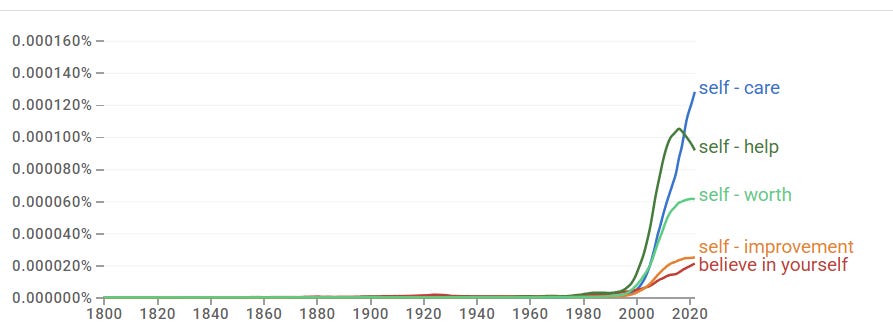Overdiagnosis Hurts
Putting Therapeutic Language in its Place
In my previous article, I mentioned overdiagnosis in relation to mental health disorders. I realized afterward that I didn’t fully explain myself. And it could lead to some confusion.
Here’s the key section of potential concern:
Culturally, there are many factors pushing against appropriately silly parenting. As Mary Midgley observed, ever since the 17th century, we think of ourselves as being like machines. And when you think of your kids as computers, you’ll think of upgrades and achievements rather than personhood and character. To be sure, our kids should grow to be more like Christ—that is a kind of “upgrade”—but we mustn’t forget how the hidden Kingdom belongs to them, right now.
Freya India recently argued, “Nobody has a personality anymore.” She noticed how today’s therapeutic approach turns every eccentricity into a problem to be solved. She’s worth quoting in full:
We have lost the sentimental ways we used to describe people. Now you are always late to things not because you are lovably forgetful, not because you are scattered and interesting and secretly loved for never arriving on time, but because of ADHD… You are the way you are not because you have a soul but because of your symptoms and diagnoses… Every heartfelt, annoying, interesting piece of you, categorised. The fond ways your family describe you, medicalised. The pieces of us once written into wedding vows, read out in eulogies, remembered with a smile, now live on doctors’ notes and mental health assessments and BetterHelp applications.
We have taken the joy out of life by crunching it into machine-like parts for the sake of statistics. Parenting becomes tinkering—looking for the next area to optimize through technique or therapy rather than peace-filled presence.
Our culture pressures us against appropriately silly parenting by over-medicalizing personhood; by labeling and diagnosing normal human behaviour. It turns joyful parenting into machine-like optimization.
My question here is, does my argument diminish the realities of those with real ADHD?
I have not changed my mind since quoting India. But on the topic of over-diagnosis, there’s more I could have said.
ADHD is real. Depression is real. Anxiety disorders are real. It is appropriate for some people to be diagnosed with various mental illnesses. All good gifts come from God, including pills and counseling.
That said, I also believe some people are labeled as having ADHD and other mental illnesses when they should not be. Not everyone. Not all the time. But I believe this happens, and it happens too often. And I think too often we self-diagnose these disorders as well.
What’s my evidence for this?
I have been reading about the rise of the therapeutic self. Part of this is through books and articles by Jon Haidt. For The Atlantic, Arthur Brooks wrote, “Being Anxious or Sad Does Not Make You Mentally Ill.” In Vanity Fair back in 2023, there was a lament of “TikTokified psychobabble,” and how “Amateur Therapy-Speak Is Just Making Us Lonelier.”
A great overview of therapeutic language is “The Christian in a Therapeutic Age” by Ian Harber. It’s great. He believes mental illness is real. He also believes that people have been misled by false and dangerous notions of “therapy.” Ian writes:
While we turn to therapy in order to heal our inner wounds, more and more people are finding themselves even more anxious and isolated than they were before. As they turn inward, they damage relationships with people who would otherwise be there to help them through difficult circumstances. This isn’t necessarily because therapy is broken but because of how we have begun to use therapy as a buffer between us and the uncomfortable realities of life when it was never meant to function that way. The more we avoid the hard knocks of life, the more we’re hurt when we’re hit by them. So, the very thing intended to help us become more resilient in a difficult world ends up making us more fragile.
And this isn’t a recent phenomenon, as if we’ve only learned of it in the past couple years. Today’s overdiagnosis is a product of a long trend toward a therapeutic approach to life in general. And Christians aren’t exempt. Christian Smith’s 2005 research on evangelicalism showed the rise of (in his terms) Moral Therapeutic Deism (MTD). Too many Christians treat God as a distant rule-giver (deistic and moral), who primarily exists to give us good feelings about ourselves (therapeutic). Of course, God does help us feel good. The Psalms talk of that. But the Psalms also talk about great sorrow and frustration. In MTD, Christians only pick the therapeutic “coffee mug” versions of Scripture and do themselves a disservice in the process.
We could go back further. In 1966 Philip Rieff wrote The Triumph of the Therapeutic.1 Carl Trueman and Timothy Keller have both summarized this book in their work. Trueman’s Rise and Triumph of the Modern Self shows how notions of Freud’s inner self (and sexualized self) have become increasingly normalized in the way we think today, and he builds upon Rieff’s work. These authors note the pendulum swing toward self-improvement and optimization, especially in how we prioritize our “selves.”
This chart from Google Ngram viewer (a tool that analyzes the frequency of words and phrases within a vast collection of digitized books) shows how much more we think about the self.
I am concerned about this trend. I’m concerned about what it does to personhood. I am concerned about what it does to our parenting, as we see our children through a lens of feeling-metrics to be optimized through therapy rather than as a person to giggle with.
And I’d argue, by the way, that keeping medical language restrained for only those people who truly deserve it is loving. Overdiagnosis (and turning personality quirks into medical illnesses) is the kind of thing that hurts those who actually struggle with such illnesses.
For the person who is sometimes late, but otherwise showing no signs of ADHD, and they say “Oh, it’s just my ADHD,” they risk trivialization, treating the realities of ADHD as a light and flippant trait.
It’s as if someone shares they struggled to climb Mount Kilimanjaro and someone else comes along and says they had a hard time recently too, since the parking spot for the grocery store was too far away.
Ultimately, we should take mental health seriously! Turning every little distraction into ADHD does the opposite.
Let’s stop doing that. Let’s enjoy the rest of summer.

Recent podcast episodes:
Thinking About The Faith (Links: Website | Apple | Spotify):
Q23: Why Must the Redeemer Be Truly God?
Q24: Why Was it Necessary for Christ, the Redeemer, to Die?
Q25: Does Christ’s Death Mean All Our Sins Can Be Forgiven?
Q26: What Else Does Christ’s Death Redeem?
Q27: Are All People, Just as They Were Lost Through Adam, Saved Through Christ?
Q28: What Happens After Death to Those Not United to Christ by Faith?
Q29: How Can We Be Saved?
Q30: What is Faith in Jesus Christ?
Q31: What Do We Believe by True Faith?
Q32: What Do Justification and Sanctification Mean?
What Would Jesus Tech (Links: Website | Apple | Spotify | YouTube):
AI Shepherds and Electric Sheep, with Pastor Paul Hoffman
A Gentle Singularity?
You Have a Calling, with Karen Swallow Prior
I have not yet read this one. It remains on my wishlist. I plan to borrow it from a local library soon.



